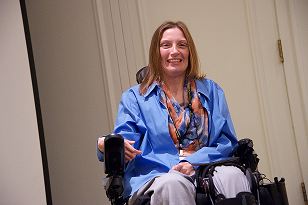Disability Issues Prominently Featured at University of Iowa Culturally Responsive Health Care Conference (IA UCEDD)
June 29, 2015

|
Staff from the Center for Disabilities and Development (CDD-Iowa's UCEDD) recently facilitated the inclusion of two disability-focused presentations at the interdisciplinary "Culturally Responsive Health Care in Iowa" conference held in Iowa City on June 5. The conference, which attracted nearly 200 health practitioners, educators, and students, was jointly sponsored by the University of Iowa's Health Sciences Colleges, University of Iowa Health Care, the University of Iowa College of Public Health, and the Center for Disabilities and Development.
Mike Hoenig, a program coordinator with CDD's Office of State and Community Projects, served on the conference planning committee and recruited an individual with a spinal cord injury to serve on a panel of diverse patients who described their experiences regarding access to quality health care. Hoenig, along with Ann Riley, a project manager with CDD's Office of State and Community Projects, then led a panel discussion which included individuals with a variety of disabilities entitled "Assuring Access to Health Care for Persons with Disabilities." Content for this session, which imparts a variety of communication strategies for health sciences students and professionals, was developed with funding from a CDC Disability and Health state grant.
CDD's involvement with the conference began last year when Hoenig, with the encouragement of his Disability and Health grant colleagues, attended the 2014 inaugural conference on Culturally Responsive Health Care. At a networking luncheon hosted during the conference, Hoenig shared his concern with Dr. Sherree Wilson, University of Iowa Associate Dean for Cultural Affairs and Diversity Initiatives, that the topic of disability was not included in the agenda. Dr. Wilson, who serves as co-chair of the conference, responded by inviting Hoenig to serve on the 2015 conference planning committee. In addition to organizing the two sessions described above, Hoenig provided technical assistance to the committee by arranging disability accommodations including a sign language interpreter, an accessible presentation venue, and screen reader friendly conference materials.
The inclusion of disability as a topic in the culturally-responsive health care conversation proved beneficial on many levels. During the Q&A session following the patient panel, the participant with a spinal cord injury provided technical assistance to an audience member regarding the use of sign language interpreters. The "Assuring Access to Health Care" panel has generated conversations with the University of Iowa College of Dentistry and Iowa Cancer Consortium about future disability education efforts. Through words and actions, conference organizers demonstrated an awareness that disability is a demographic which significantly impacts access to quality health care. Their proactive outreach to encourage persons with disabilities to tell their stories at the conference alongside peers from other underrepresented and underserved populations is illustrative of the principles outlined in AUCD's Diversity and Inclusion blueprint.







